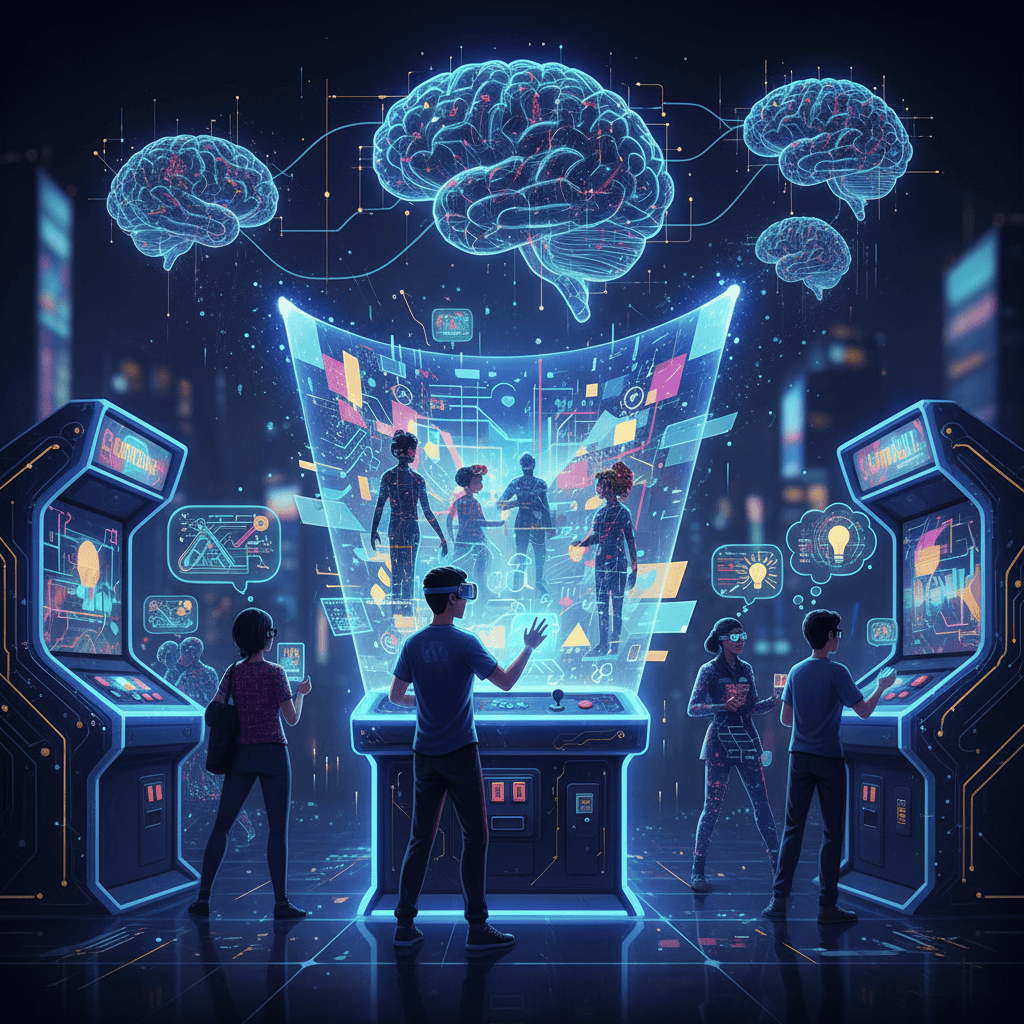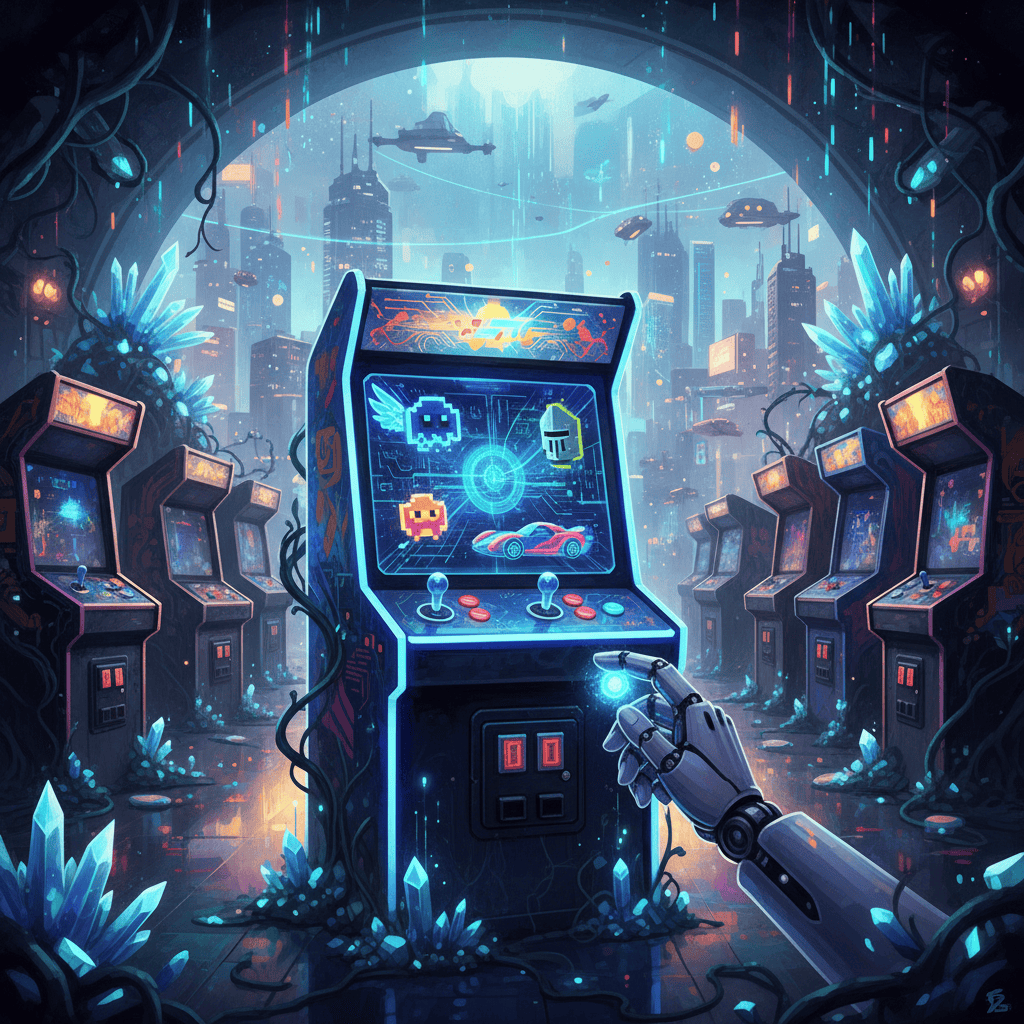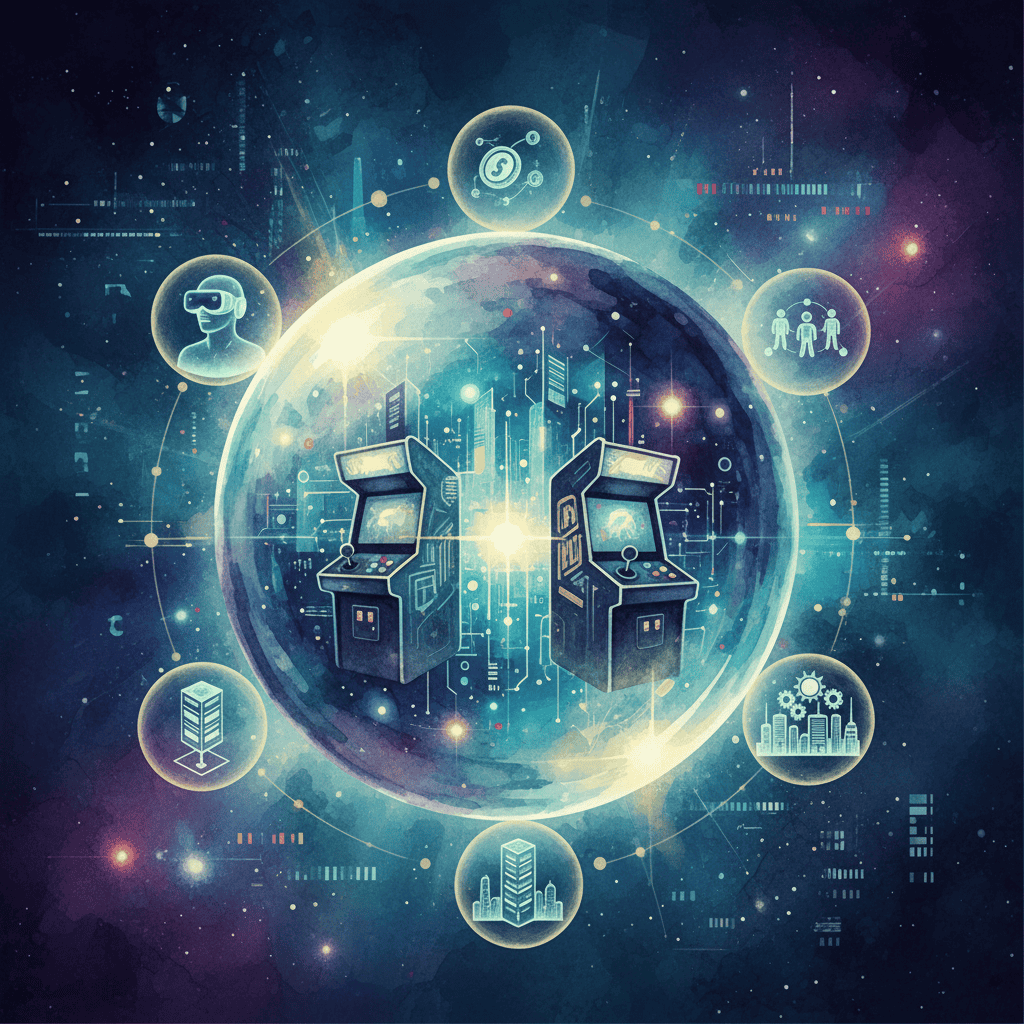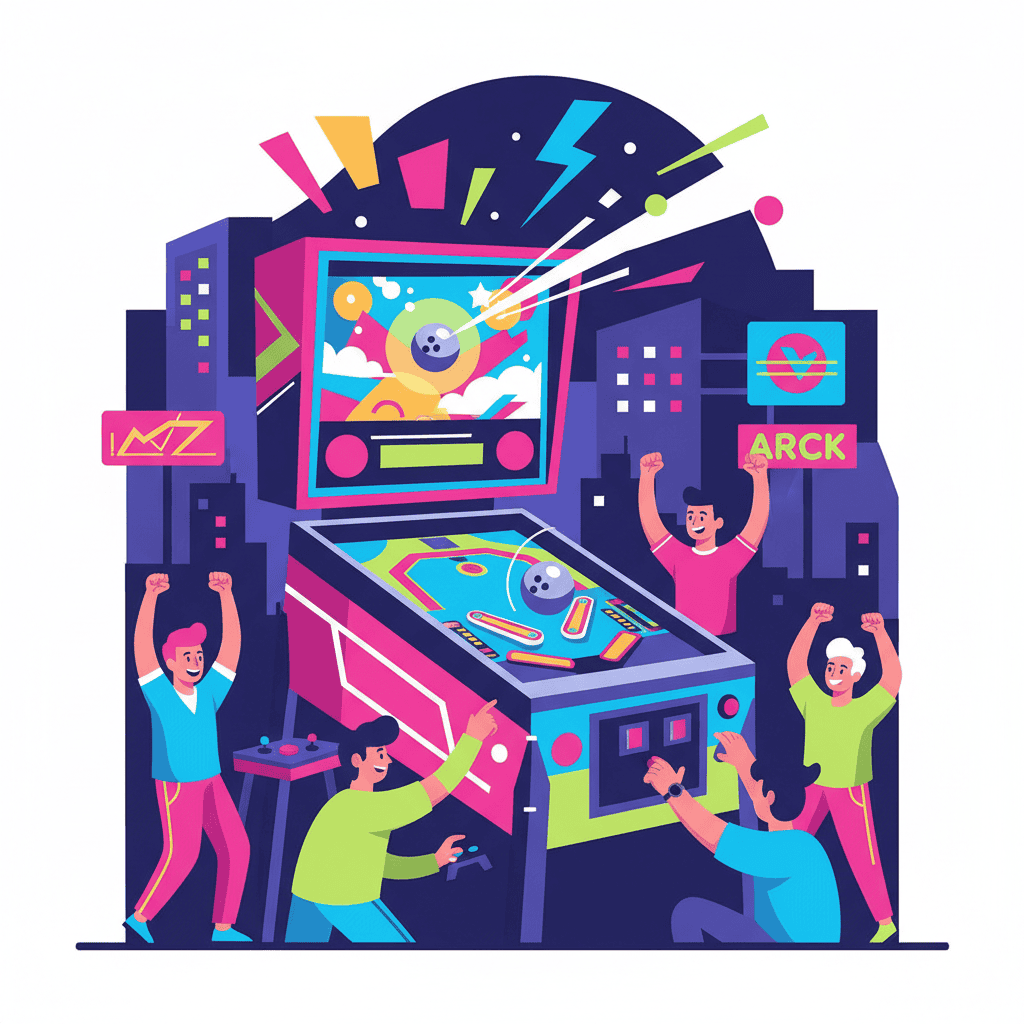Navigating the ever-evolving world of arcade games can feel like trying to beat Galaga on a broken joystick. Are AI-powered games the next big thing, or just another fad? Let’s dive in and see if we can nail a high score on this question.
The AI Revolution: More Than Just Fancy Graphics
My first arcade experience was a dingy basement in the early 80s, mesmerized by the relentless action of Pac-Man. Back then, the challenge was purely skill-based. Today, AI is injecting a new layer of complexity, and it’s not just about better graphics. We’re seeing AI opponents adapt and learn, creating dynamic gameplay that keeps you on your toes. Games like AI War: Fleet Command showcase this perfectly; the alien AI is relentlessly cunning, forcing players to adapt their strategy constantly. This isn’t the simple, predictable AI of old; it’s a thinking opponent.

Retro Veterans might recall the limited AI in classic games, easily exploited with cheesy tactics. Modern Indie Fans are now enjoying AI that feels significantly more advanced, leading to a fresh sense of challenge. Even Curious Newcomers will appreciate the dynamic difficulty adjustment found in many newer AI-powered arcade games; it’s like having a personal tutor challenging you just enough. I recently played a title on Steam – Synaptic Drive – where the AI completely changed its attack pattern midway through, almost catching me completely off guard. It felt fresh and genuinely exciting.
AI as a Game Designer: Procedural Generation and Beyond
One of the most exciting applications of AI in arcades is procedural generation. Imagine an endless runner where the level layout is dynamically created in response to your playstyle. It’s like having a team of game designers working 24/7 to tailor the experience just for you. This is already happening in games like Noita and Spelunky 2, though not strictly arcade games. Still, the same principles apply.
- A common mistake I see new players make is underestimating the adaptability of AI-driven procedural generation. They get stuck in a repetitive loop of actions, failing to exploit the changing game landscape.
- My go-to strategy for this kind of game involves careful observation and risk assessment: identify patterns, adjust my approach accordingly, and even embrace mistakes as learning opportunities.
Games like Rogue Legacy 2 take this further by incorporating inheritance mechanics, blending procedural generation with RPG elements to create a uniquely replayable experience. The possibilities are vast; imagine fighting games with randomly generated special moves or puzzle games with constantly shifting layouts. This kind of unpredictability adds endless replay value.
The Challenges of AI Integration
However, integrating AI seamlessly isn’t a walk in the park. Balancing difficulty, preventing predictability, and ensuring a fair gaming experience are major challenges. An overly aggressive AI can lead to frustration, while a passive one can make the game boring. The AI in the early versions of DOOM Eternal was notoriously challenging, but subsequent patches refined it significantly. The developers learned from the player feedback, iterating and adjusting the AI’s behavior to find that perfect balance.
The key takeaway here is that successful AI integration requires careful tuning and iterative development. It’s not just about throwing powerful AI at the player; it’s about creating a fun and engaging experience.
The Human Element: Skill vs. Luck?
Some worry that AI might overshadow player skill. Will we see games where victory relies more on luck than mastery? I don’t think so. While AI can adjust difficulty, a well-designed game will still reward strategic thinking, precise execution, and pattern recognition. The beauty of a great arcade game lies in the elegant dance between player skill and challenging AI. The skill ceiling remains a critical factor.
Consider the evolution of fighting games. The early days featured predictable AI, easily exploited by button mashers. Modern fighting game AI, however, can read your playstyle, anticipating your moves and countering accordingly. This raises the skill ceiling, pushing players to learn advanced techniques and adapt their strategy continuously.
Classic arcade games like Street Fighter II* relied almost entirely on player skill. The AI was weak, but that was part of the charm. However, modern AI is changing that paradigm, demanding a more nuanced approach to gameplay.
The Future of Arcade Fun: A Hybrid Approach
The future of arcade games, I believe, isn’t about AI vs. human skill; it’s about the intelligent combination of both, shaping the future of gaming. Imagine games that utilize AI to craft dynamic, unpredictable challenges that still depend on player skill to overcome. The AI acts as a collaborative partner, enhancing the gaming experience instead of dominating it. A good example here is how AI could be used to create challenging boss fights: the AI could create variations of existing patterns, creating unexpected attacks, increasing the challenge without the need for an unreasonable difficulty spike.
The best example of this is how modern fighting games like Tekken 7 incorporate a wide range of AI opponents with varying difficulty levels and styles. Each AI opponent is a unique challenge, demanding careful strategic approach, adaptation, and learning of opponent strategies.
| Game Title | AI Role | Strengths | Weaknesses |
|---|---|---|---|
| AI War: Fleet Command | Strategic opponent | Dynamic, adaptive, challenging | Steep learning curve |
| Synaptic Drive | Level design, opponent AI | Unique, unpredictable challenges | Some frustrating moments |
| Tekken 7 | Diverse opponent types | Wide range of difficulty levels and styles | Some predictable patterns at lower levels |
The Next Generation of Arcade Joysticks?
This brings me to another point: hardware. The AI revolution will likely impact arcade controller design. Perhaps we’ll see peripherals that offer haptic feedback that adjusts based on the AI’s actions, giving players a more visceral experience. Perhaps even AI-powered controllers designed to help you perform combos you couldn’t pull off otherwise.
The Arcade’s Evolution Continues
So, is the future of arcade fun AI-powered? Absolutely. But it’s not about replacing the human element; it’s about enhancing it. By understanding and mastering the interplay of AI and human skill, we can unlock new heights of gaming excitement. It’s about creating games that are both challenging and rewarding, dynamic and predictable in the right measure. The arcade scene, ever since its inception, has always adapted and evolved. It’s exciting to witness this next chapter unfolding.
High Score Strategies for AI-Powered Games
The key is to constantly adapt, just as AI does. Be ready for the unexpected, observe patterns, and learn from your mistakes. Don’t just button mash; think strategically. This is not just about reflexes; it is about the application of knowledge, pattern recognition and adaptation.
What’s Next?
Level Up Your AI Game: Seek out AI-powered arcade games, experiment with different titles, and let me know your experiences in the comments below. Let’s build a community of experts ready to conquer the future of arcade gaming.

Frequently Asked Arcade AI Questions
Q: Will AI make arcade games too easy?
A: Not necessarily. Well-designed AI can offer a dynamic challenge, adjusting to your skill level. It can create a more personalized experience, rather than simply making the game easier.
Q: Are there any AI-powered arcade cabinets already available?
A: While dedicated AI-powered cabinets are still somewhat rare, many modern arcade games incorporate AI in their design, and these are often available in arcades or at home via emulation or PC.
Q: How do AI-powered arcade games compare to classic arcade games?
A: They offer a different type of challenge. Classic games emphasized rote memorization and precise actions; AI-powered games focus on adaptation and strategic thinking in response to dynamic gameplay.
Q: Can AI help players improve their skills?
A: Yes, AI opponents can provide valuable feedback, exposing weaknesses in your gameplay and helping you learn better strategies. Dynamic difficulty adjustments could act as a personal tutor.
Q: What are some ethical considerations regarding AI in arcade games?
A: Ensuring fair play, preventing exploits, and maintaining the integrity of the competitive scene are crucial ethical considerations.
Q: What role will VR play in the future of AI-powered arcade games?
A: VR could provide incredible immersion, enhancing the impact of AI-driven environmental changes and dynamic events.
Q: How will AI affect the design of future arcade controllers?
A: AI could influence the creation of more responsive and adaptive controllers, potentially offering haptic feedback tailored to specific in-game events.
Cracking the Code: AI's Impact on the Modern Arcade Experience




